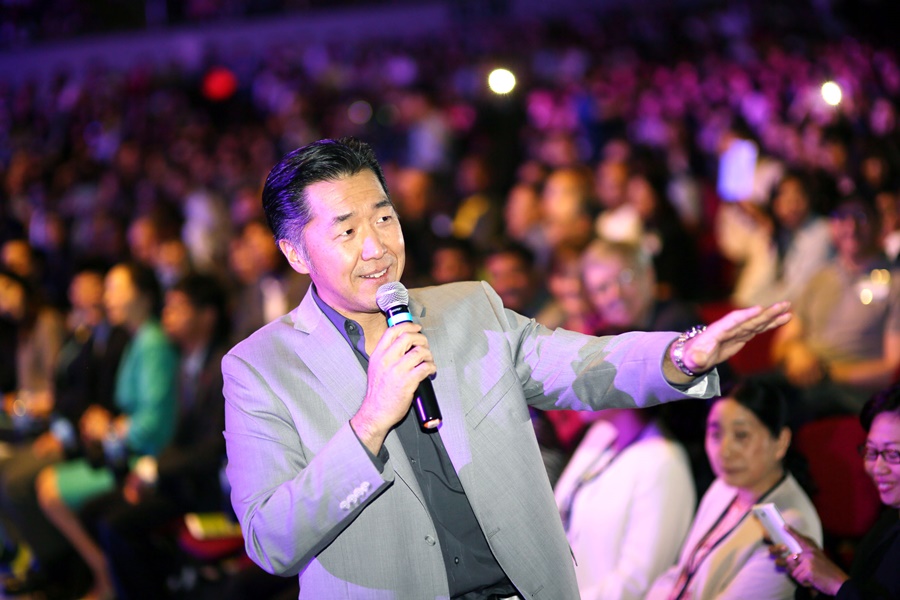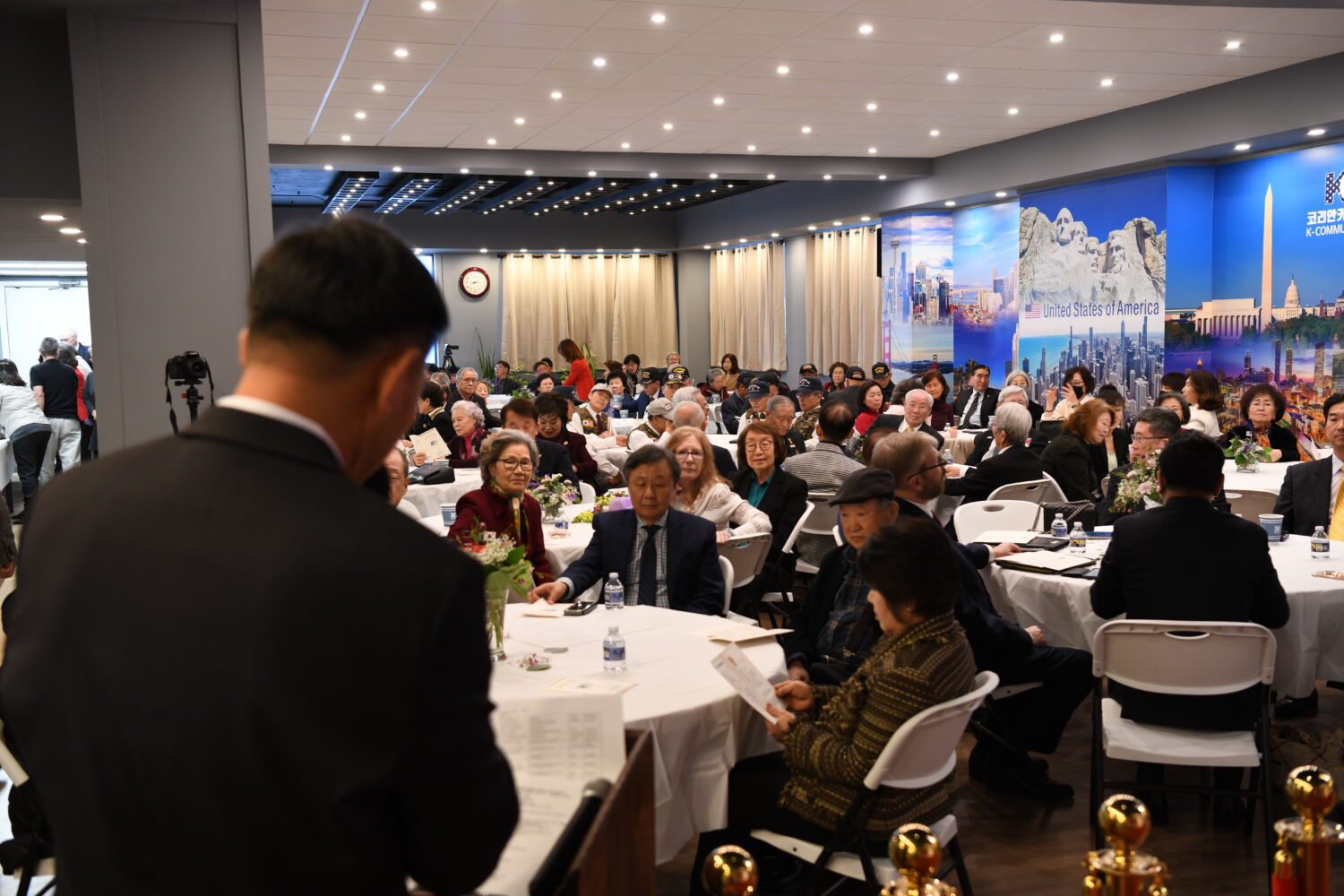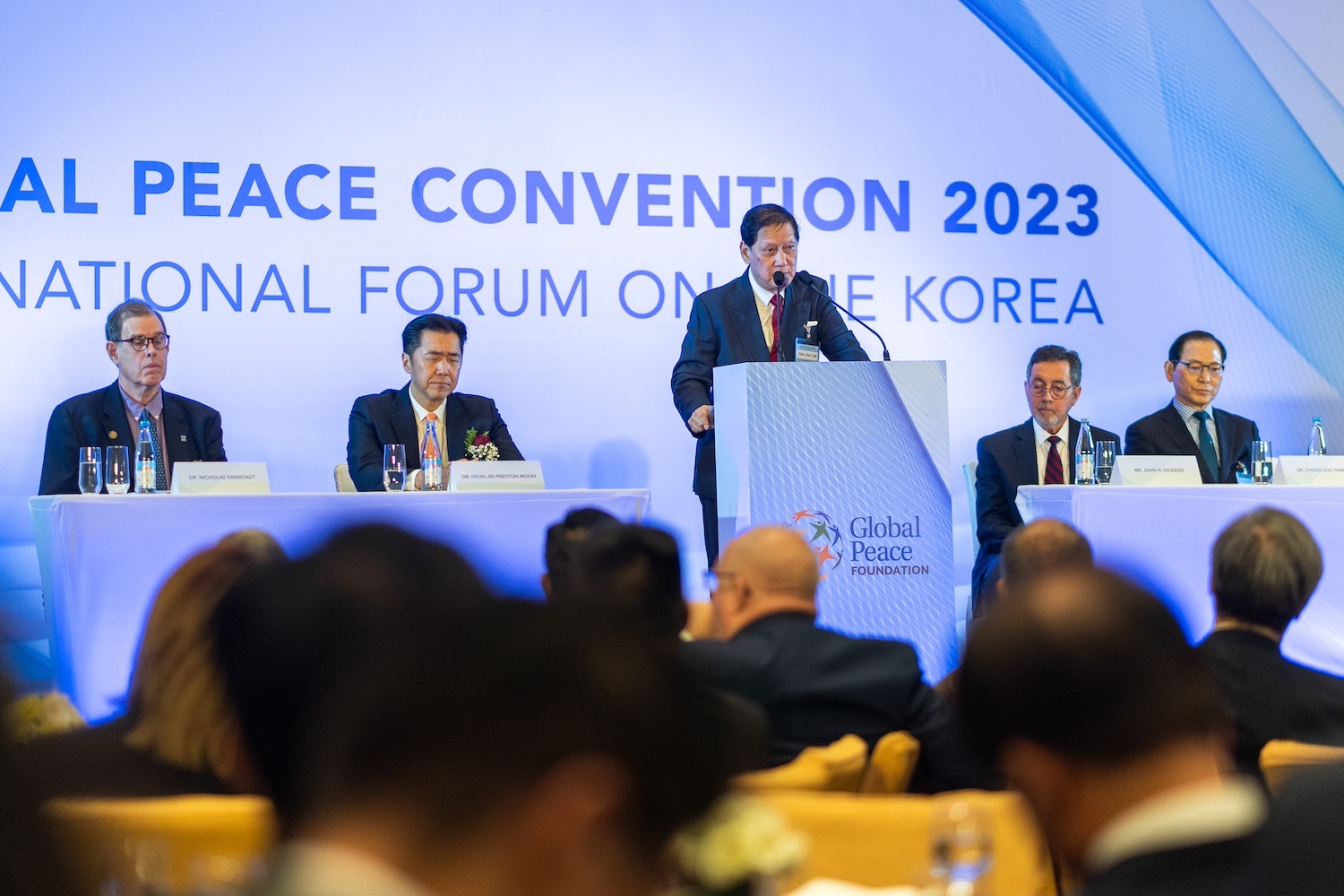Global Peace Foundation (GPF) Founder and Chairman Dr. Hyun Jin P. Moon was interviewed by Hyo-jin Lee for The Korea Times on the future of a unified Korean peninsula. Dr. Moon is the award-winning author of Korean Dream: A Vision for a Unified Korea. His work became a best-seller in the Republic of Korea and made the recommended reading list of the Director of the U.S. DIA.
Find the original interview in The Korea Times.

Dr Hyun Jin Preston Moon, Global Youth Summit 2017
Moon encourages the young generation to take part in the ‘Korean Dream’ initiative
After more than seven decades of hostilities between South and North Korea, unification may sound like a distant goal for many—especially the younger generations. For them, integrating the capitalist south with the communist north is becoming an increasingly far-fetched idea amid the widening economic and cultural gaps that exist between the two.
However, Hyun Jin Preston Moon, the founder and chairman of the Washington D.C.-based non-profit group Global Peace Foundation (GPF), strongly believes that young people will play a significant role in achieving unification on the Korean Peninsula.
After establishing the foundation in 2009, Moon has been campaigning for unification based on the founding ideal of Korea’s “Hongik Ingan,” which means “to live for the greater benefit of all mankind.”
“If I speak to young people here in Korea, they have been misinformed about unification, and that is one of the reasons why a lot of the concepts they have are wrong,” he said during an interview with The Korea Times in Seoul, Feb. 20. “They don’t seem to understand what opportunities will be afforded to them if that [unification] happens. It will be the greatest transformative opportunity in their lifetime,” he said.
With that, he stressed the importance of quality education for young people.
“Education is absolutely the key. If you want to have the public to make good decisions, you have to provide them with the right information. There’s a lot of ideas out there that are not really good ideas―and have been disproven historically―and yet are now still being pushed upon young people.”
Unification achievable through grassroots movements
During the interview, Moon introduced what he calls the “Korean Dream” framework as a tool to achieve the unification of the two Koreas and create a common national identity. The initiative is based on the notion that feasible progress on unification will be made by grassroots movements of ordinary people, not top-down decisions by policymakers.
He said that diplomatic initiatives, bilateral talks and summits aimed at resolving security concerns surrounding North Korea’s nuclear weapons program have led to little progress so far.
Against this backdrop, he established Action for Korea United (AKU) in 2012, a coalition of 1,000 civic organizations which aims for a grassroots approach to raising public awareness of the importance of unification.
“Ordinary people are going to be the gate openers. If people are moving in a certain direction and a central vision is what’s driving them, eventually, the politicians are going to follow, and they’re going to open the doors. That’s what happened with the downfall of the Soviet Union and German unification,” he said.
Such an initiative seems to be showing visible progress.
In February, the GPF held a so-called “10 million people’s Korean Dream rally for the 80th anniversary of Korean Liberation,” with the aim of gathering 10 million people in Korea and overseas by 2025 to establish the goal of achieving unification by then. 2025 marks the 80th anniversary of Korea’s liberation from Japanese colonial rule that ended in 1945.
After the inaugural ceremony held in the southeastern port city of Busan on Feb. 2, large-scale rallies were held in major cities―in Gwangju on Feb. 4, in Daejeon on Feb. 11 and Daegu on Feb. 18. The last ceremony was held in Seoul on Feb. 21, bringing together over 600 scholars and prominent figures.
Asked why he chose Busan as the first city to hold the rallies, Moon said, “Busan has always been the gateway to the world or Asia-Pacific. And historically, it was the last stronghold during the Korean War. It’s not only the gateway to Asia but also really the beginning of change, and that’s why it started with Busan.”
However, Moon said his ultimate goal is to gather the voices of Koreans not only in the nation but also those of the Korean diaspora overseas.
“There are more than 7 million or 8 million Koreans that live abroad, and we want their voices to be mixed in with the voices of those who are on the peninsula. And we also want voices of those even in North Korea,” he said.
Moon went on to say that if his vision materialized, Korea would become a model nation for peace and prosperity.
“When I’m talking about the Korean Dream, I’m not talking about just unification of the Korean Peninsula. I’m talking about creating a model nation that can be a leader on the global stage.”
“If the divided Korea all of a sudden comes together as one―not because of nuclear arms or nuclear weapons―but based on a vision rooted in their history in their historical mandate to create a model nation, that will be the inspirational story of the century. It will set a tremendous precedent for the world,” he said.
While some may think integrating South Korea and North Korea may bring more of a financial burden to the South, Moon believes otherwise. He said developed countries like the United States could be a significant partner for unification in terms of economic assistance, given that North Korea is its top security concern.
He likened it to the Marshall Plan, a U.S.-sponsored post-World War II program that supported the reconstruction of enemy nations and eventually brought them into the fold of Western democracies.
Plus, Moon added that if Korea is united based upon the Korean Dream model, it is likely for the nation to be the financial center of Asia, replacing Hong Kong.
“Given the posture of China, there is no way that international finance and international banks would want to have their headquarters there. A nation such as Korea, based upon the Korean Dream model is the bulwark of freedom and fundamental human rights that upholds Western values. So naturally, we’ll draw on all of that,” he said.



